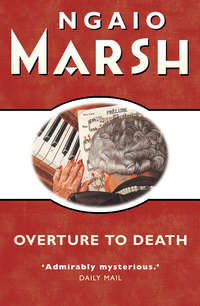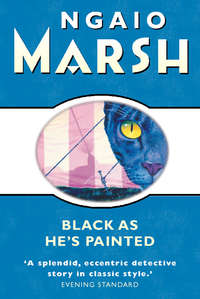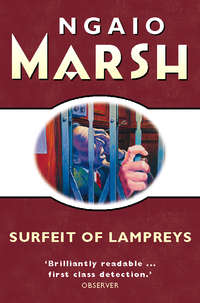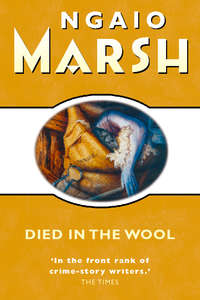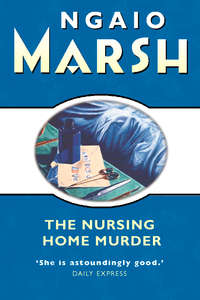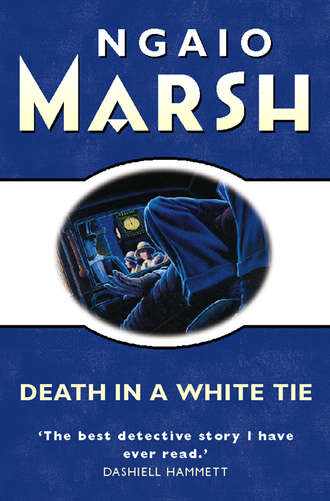
Полная версия
Death in a White Tie
‘We rather fancy you, too.’
‘It was very similar,’ said Lord Robert. ‘It was exceedingly similar. On my honour.’
‘Good Lord,’ said Alleyn mildly. ‘That’s what the Americans call a break. Coincidence stretches out a long arm. So does the law. “Shake,” says Coincidence. Not such a very long arm, after all, if this pretty fellow is working among one class only and it looks as if he is.’ He shoved a box of cigarettes in Lord Robert’s direction. ‘We had an expert at that letter—the Mrs H-H one you’ve got there. Woolworth paper. She didn’t show us the envelope, of course. Woolworth ink and the sort of nib they use for script writing. It’s square with a feeder. You notice the letters are all neatly fitted between the ruled lines. That and the script nib and the fact that the letters are careful copies of ordinary print completely knocks out any sort of individuality. There were no finger-prints and Mrs Halcut-Hackett hadn’t noticed the postmark. Come in!’
A police constable marched in with a packet of letters, laid them on the desk and marched out again.
‘Half a moment while I have a look at my mail, Bunchy; there may just be—yes, by gum, there is!’
He opened an envelope, glanced at a short note, unfolded an enclosure, raised his eyebrows and handed it to Lord Robert.
‘Wheeoo!’ whistled Lord Robert.
It was a sheet of common ruled paper. Three or four rows of script were fitted neatly between the lines. Lord Robert read aloud:
‘ “Unforeseen circumstances prevented collection on Monday night. Please leave bag with same sum down between seat and left-hand arm of blue sofa in concert-room, 57 Constance Street, next Thursday afternoon.” ’
‘Mrs Halcut-Hackett,’ said Alleyn, holding out the note, ‘explains that her unfortunate friend received this letter by yesterday evening’s post. What’s happening on Thursday at 57 Constance Street? Do you know?’
‘Those new concert-rooms. Very smart. It’s another charity show. Tickets on sale everywhere. Three guineas each. Chamber music. Bach. Sirmione Quartette. I’m going.’
‘Bunchy,’ said Alleyn, ‘let nothing wean you from the blue sofa. Talk to Mrs Halcut-Hackett. Share the blue sofa with her and when the austere delights of Bach knock at your heart pay no attention but with the very comment of your soul—’
‘Yes, yes, yes. Don’t quote now, Roderick, or somebody may think you’re a detective.’
‘Blast you!’ said Alleyn.
Lord Robert gave a little crowing laugh and rose from his chair.
‘I’m off,’ he said. Alleyn walked with him into the corridor. They shook hands. Alleyn stood looking after him as he walked away with small steps, a quaint out-of-date figure, black against a window at the end of the long passage. The figure grew smaller and smaller, paused for a second at the end of the passage, turned the corner and was gone.
CHAPTER 3 Sequence to a Cocktail-party
A few days after his visit to the Yard, Lord Robert Gospell attended a cocktail-party given by Mrs Halcut-Hackett for her plain protégée. Who this plain protégée was, nobody seemed to know, but it was generally supposed that Mrs Halcut-Hackett’s object in bringing her out was not entirely philanthropic. At the moment nobody ever remembered the girl’s name but merely recognized her as a kind of coda to Mrs Halcut-Hackett’s social activities.
This was one of the first large cocktail-parties of the season and there were as many as two hundred and fifty guests there. Lord Robert adored parties of all kinds and was, as Alleyn had pointed out, asked everywhere. He knew intimately that section of people to whom the London season is a sort of colossal hurdle to be taken in an exhilarating leap or floundered over as well as may be. He was in tremendous demand as a chaperone’s partner, could be depended on to help with those unfortunate children of seventeen who, in spite of all the efforts of finishing schools, dressmakers, hairdressers, face-specialists and their unflagging mothers, were apt to be seen standing alone nervously smiling on the outskirts of groups. With these unhappy débutantes Lord Robert took infinite trouble. He would tell them harmless little stories and when they laughed would respond as if they themselves had said something amusing. His sharp little eyes would search about for younger men than himself and he would draw them into a group round himself and the girl. Because of his reputation as a gentle wit, the wariest and most conceited young men were always glad to be seen talking to Lord Robert, and soon the débutante would find herself the only girl in a group of men who seemed to be enjoying themselves. Her nervous smile would vanish and a delicious feeling of confidence would inspire her. And when Lord Robert saw her eyes grow bright and her hands relax, he would slip away and join the cluster of chaperones where he told stories a little less harmless and equally diverting.
But in the plain protégée of General and Mrs Halcut-Hackett he met his Waterloo. She was not so very plain but only rather disastrously uneventful. Every inch of this unhappy child had been prepared for the cocktail-party with passionate care and at great expense by her chaperone—one of those important American women with lovely faces and cast-iron figures. Lord Robert was greeted by Mrs Halcut-Hackett, who looked a little older than usual, and by her husband the General, a notable fire-eater who bawled ‘What!’ two or three times and burst into loud surprising laughter which was his method of circulating massed gaiety. Lord Robert twinkled at him and passed on into the thick of the party. A servant whom he recognized as the Halcut-Hacketts’ butler gave him a drink. ‘Then they’re not having Dimitri or anybody like that,’ thought Lord Robert. He looked about him. On the right-hand side of the enormous room were collected the débutantes, and the young men who, in the last analysis, could make the antics of the best dance-bands in London, all the efforts of all the Dimitris, Miss Harrises, and Mrs Halcut-Hacketts to the tune of a thousand pounds, look like a single impotent gesture. Among them were the young men who were spoken of, in varying degrees of irony, as ‘The Debs’ Delight.’ Lord Robert half suspected his nephew Donald of being a Debs’ Delight. There he was in the middle of it all with Bridget O’Brien, making himself agreeable. Very popular, evidently. ‘He’ll have to settle down,’ thought Lord Robert. ‘He’s altogether too irresponsible and he’s beginning to look dissipated. Don’t like it.’
Then he saw the plain protégée of Mrs Halcut-Hackett. She had just met a trio of incoming débutantes and had taken them to their right side of the room. He saw how they all spoke politely and pleasantly to her but without any air of intimacy. He saw her linger a moment while they were drawn into the whirlpool of high-pitched conversation. Then she turned away and stood looking towards the door where her chaperone dealt faithfully with the arrivals. She seemed utterly lost. Lord Robert crossed the room and greeted her with his old-fashioned bow.
‘How-de-do. This is a good party,’ he said, with a beaming smile.
‘Oh! Oh—I’m so glad.’
‘I’m an old hand, y’know,’ continued Lord Robert, ‘and I always judge a cocktail-party by the time that elapses between one’s paying one’s respects and getting a drink. Now this evening I was given this excellent drink within two minutes of shaking hands with the General. Being a thirsty, greedy old customer, I said to myself: “Good party.” ’
‘I’m so glad,’ repeated the child.
She was staring, he noticed, at her chaperone, and he saw that Mrs Halcut-Hackett was talking to a tall smooth man with a heavy face, lack-lustre eyes and a proprietary manner. Lord Robert looked fixedly at this individual.
‘Do tell me,’ he said, ‘who is that man with our hostess?’
The girl started violently and without taking her gaze off Mrs Halcut-Hackett, said woodenly: ‘It’s Captain Withers.’
‘Ah,’ thought Lord Robert, ‘I fancied it was.’ Aloud he said: ‘Withers? Then it’s not the same feller. I rather thought I knew him.’
‘Oh,’ said the protégée. She had turned her head slightly and he saw that she now looked at the General. ‘Like a frightened rabbit,’ thought Lord Robert. ‘For all the world like a frightened rabbit.’ The General had borne down upon his wife and Captain Withers. Lord Robert now witnessed a curious little scene. General Halcut-Hackett glared for three seconds at Captain Withers who smiled, bowed, and moved away. The General then spoke to his wife and immediately, for a fraction of a second, the terror—Lord Robert decided that terror was not too strong a word—that shone in the protégée’s eyes was reflected in the chaperone’s. Only for a second, and then with her husband she turned to greet a new arrival who Lord Robert saw with pleasure was Lady Alleyn. She was followed by a thin girl with copper-coloured hair and slanting eyebrows that at once reminded him of his friend Roderick. ‘Must be the niece,’ he decided. The girl at his side suddenly murmured an excuse and hurried away to greet Sarah Alleyn. Lord Robert finished his drink and was given another. In a few minutes he was surrounded by acquaintances and was embarked upon one of his new stories. He made his point very neatly, drifted away on the wave of laughter that greeted it, and found Lady Alleyn.
‘My dear Bunchy,’ she said, ‘you are the very person I hoped to see. Come and gossip with me. I feel like a phoenix.’
‘You look like a princess,’ he said. ‘Why do we meet so seldom? Where shall we go?’
‘If there is a corner reserved for grandmothers I ought to be in it. Good heavens, how everybody screams. How old are you, Bunchy?’
‘Fifty-five, m’dear.’
‘I’m sixty-five. Do you find people very noisy nowadays or are you still too much of a chicken?’
‘I enjoy parties, awfully, but I agree that there ain’t much repose in modern intercourse.’
‘That’s it,’ said Lady Alleyn, settling herself in a chair. ‘No repose. All the same I like the moderns, especially the fledgelings. As Roderick says, they finish their thoughts. We only did that in the privacy of our bedrooms and very often asked forgiveness of our Creator for doing it. What do you think of Sarah?’
‘She looks a darling,’ said Lord Robert emphatically.
‘She’s a pleasant creature. Amazingly casual but she’s got character and, I think, looks,’ said her grandmother. ‘Who are those young things she’s talking to?’
‘Bridget O’Brien and my young scapegrace of a nephew.’
‘So that’s Evelyn Carrados’s girl. She’s like Paddy, isn’t she?’
‘She’s very like both of ‘em. Have you seen Evelyn lately?’
‘We dined there last night for the play. What’s the matter with Evelyn?’
‘Eh?’ exclaimed Lord Robert. ‘You’ve spotted it, have you? You’re a wise woman, m’dear.’
‘She’s all over the place. Does Carrados bully her?’
‘Bully ain’t quite the word. He’s devilish grand and patient, though. But—’
‘But there’s something more. What was the reason for your meeting with Roderick the other day?’
‘Hi!’ expostulated Lord Robert in a hurry. ‘What are you up to?’
‘I shouldn’t let you tell me if you tried. I trust,’ said Lady Alleyn untruthfully but with great dignity, ‘that I am not a curious woman.’
‘That’s pretty rich.’
‘I don’t know what you mean,’ said Lady Alleyn grandly. ‘But I tell you what, Bunchy. I’ve got neurotic women on the brain. Nervous women. Women that are on their guard. It’s a most extraordinary thing,’ she continued, rubbing her nose with a gesture that reminded Lord Robert of her son, ‘but there’s precisely the same look in our hostess’s mascaraed eyes as Evelyn Carrados had in her naturally beautiful ones. Or has this extraordinary drink gone to my head?’
‘The drink,’ said Lord Robert firmly, ‘has gone to your head.’
‘Dear Bunchy,’ murmured Lady Alleyn. Their eyes met and they exchanged smiles. The cocktail-party surged politely about them. The noise, the smoke, the festive smell of flowers and alcohol, seemed to increase every moment. Wandering parents eddied round Lady Alleyn’s chair. Lord Robert remained beside her listening with pleasure to her cool light voice and looking out of the corner of his eye at Mrs Halcut-Hackett. Apparently all the guests had arrived. She was moving into the room. This was his chance. He turned round and suddenly found himself face to face with Captain Withers. For a moment they stood and looked at each other. Withers was a tall man and Lord Robert was obliged to tilt his head back a little. Withers was a fine arrogant figure, Lord Robert a plump and comical one. But oddly enough it was Lord Robert who seemed the more dominant and more dignified of these two men and before his mild glare the other suddenly looked furtive. His coarse, handsome face became quite white. Some seconds elapsed before he spoke.
‘Oh—ah—how do you do?’ said Captain Withers very heartily.
‘Good evening,’ said Lord Robert and turned back to Lady Alleyn. Captain Withers walked quickly away.
‘Why, Bunchy,’ said Lady Alleyn softly, ‘I’ve never seen you snub anybody before.’
‘D’you know who that was?’
‘No.’
‘Feller called Maurice Withers. He’s a throw-back to my Foreign Office days.’
‘He’s frightened of you.’
‘I hope so,’ said Lord Robert. ‘I’ll trot along and pay my respects to my hostess. It’s been charming seeing you. Will you dine with me one evening? Bring Roderick. Can you give me an evening? Now?’
‘I’m so busy with Sarah. May we ring you up? If it can be managed—’
‘It must be. Au ‘voir, m’dear.’
‘Good-bye, Bunchy.’
He made his little bow and picked his way through the crowd to Mrs Halcut-Hackett.
‘I’m on my way out,’ he said, ‘but I hoped to get a word with you. Perfectly splendid party.’
She turned all the headlights of her social manner full on him. It was, he decided compassionately, a bogus manner. An imitation, but what a good imitation. She called him ‘dear Lord Robert’ like a grande dame in a slightly dated comedy. Her American voice, which he remembered thinking charming in her theatrical days, was now much disciplined and none the better for it. She asked him if he was doing the season very thoroughly and he replied with his usual twinkle that he got about a bit.
‘Are you going to the show at the Constance Street Rooms on Thursday afternoon?’ he asked. ‘I’m looking forward to that awfully.’
Her eyes went blank but she scarcely paused before answering yes, she believed she was.
‘It’s the Sirmione Quartette,’ said Lord Robert. ‘Awfully good, ain’t they? Real top-notchers.’
Mrs Halcut-Hackett said she adored music, especially classical music.
‘Well,’ said Lord Robert, ‘I’ll give myself the pleasure of looking out for you there if it wouldn’t bore you. Not so many people nowadays enjoy Bach.’
Mrs Halcut-Hackett said she thought Bach was marvellous.
‘Do tell me,’ said Lord Robert with his engaging air of enjoying a gossip. ‘I’ve just run into a feller whose face looked as familiar as anything, but I can’t place him. Feller over there talking to the girl in red.’
He saw patches of rouge on her cheeks suddenly start up in hard isolation and he thought: ‘That’s shaken her, poor thing.’
She said: ‘Do you mean Captain Maurice Withers?’
‘Maybe. The name don’t strike a chord, though. I’ve got a shocking memory. Better be getting along. May I look out for you on Thursday? Thank you so much. Good-bye.’
‘Good-bye, dear Lord Robert,’ said Mrs Halcut-Hackett.
He edged his way out and was waiting patiently for his hat and umbrella when someone at his elbow said:
‘Hullo, Uncle Bunch, are you going home?’
Lord Robert turned slowly and saw his nephew.
‘What? Oh, it’s you, Donald! Yes, I am! Taking a cab. Want a lift?’
‘Yes, please,’ said Donald.
Lord Robert looked over his glasses at his nephew and remarked that he seemed rather agitated. He thought: ‘What the deuce is the matter with everybody?’ but he only said: ‘Come along, then,’ and together they went out into the street. Lord Robert held up his umbrella and a taxi drew in to the kerb.
‘’Evening, m’lord,’ said the driver.
‘Oh, it’s you, is it?’ said Lord Robert. ‘’Evening. We’re going home.’
‘Two hundred Cheyne Walk. Very good, m’lord,’ wheezed the driver. He was a goggle-eyed, grey-haired, mottle-faced taximan with an air of good-humoured truculence about him. He slammed the door on them, jerked down the lever of his meter, and started up his engine.
‘Everybody knows you, Uncle Bunch,’ said Donald in a voice that was not quite natural. ‘Even the casual taxi-driver.’
‘This feller cruises about in our part of the world,’ said Lord Robert. He twisted himself round in his seat and again looked at his nephew over the top of his glasses. ‘What’s up?’ he asked.
‘I—well—nothing. I mean, why do you think anything’s up?’
‘Now then,’ said Lord Robert. ‘No jiggery-pokery. What’s up?’
‘Well, as a matter of fact,’ answered Donald, kicking the turned-up seat in front of him, ‘I did rather want a word with you. I—I’m in a bit of a tight corner, Uncle Bunch.’
‘Money?’ asked his uncle.
‘How did you guess?’
‘Don’t be an ass, my boy. What is it?’
‘I—well, I was wondering if you would mind—I mean, I know I’ve been a bit extravagant. I’m damn sorry it’s happened. I suppose I’ve been a fool but I’m simply draped in sackcloth and steeped in ashes. Never again!’
‘Come, come, come,’ said Lord Robert crisply. ‘What is it? Gambling?’
‘Well—yes. With a slight hint of riotous living. Gambling mostly.’
‘Racing? Cards?’
‘A bit, but actually I dropped the worst packet at roulette.’
‘Good Gad!’ exclaimed Lord Robert with surprising violence. ‘Where the devil do you play roulette?’
‘Well, actually it was at a house out at Leatherhead. It belongs to a man who was at that party. Some people I know took me there. It turned out to be a rather enterprising sort of gamble with a roulette-table and six fellows doing croupier. All in order, you know. I mean it’s not run for anything but fun naturally, and Captain Withers simply takes on the bank—’
‘Who?’
‘The person’s name is Withers.’
‘When was this party?’
‘Oh, a week or so ago. They have them fairly regularly. I paid all right, but—but it just about cleaned me up. I had the most amazing bad luck, actually. Would you believe it, there was a run of seventeen against me on the even chances? Bad. Very bad,’ said Donald with an unconvincing return to his lighter manner. ‘Disastrous, in fact.’
‘You’re shying about,’ said Lord Robert. ‘What’s the real trouble?’
‘One of my cheques has been returned R/D. I’m bust.’
‘I paid your Oxford debts and started you off with five hundred as a yearly allowance. Are you telling me you’ve gone through five hundred since you came down?’
‘I’m sorry,’ said Donald. ‘Yes.’
‘Your mother gives you four pounds a week, don’t she?’
‘Yes.’
Lord Robert suddenly whisked out a notebook.
‘How much was this returned cheque?’
‘Fifty quid. Awful, isn’t it?’ He glanced at his uncle’s profile and saw that his lips were pursed in a soundless whistle. Donald decided that it was not as bad as he had feared and said more hopefully: ‘Isn’t it a bore?’
Lord Robert, his pencil poised, said: ‘Who was it made out to?’
‘To Wits—Withers—everyone calls him Wits. You see, I had a side bet with him.’
Lord Robert wrote, turned, and looked over his spectacles at his nephew.
‘I’ll send Withers a cheque tonight,’ he said.
‘Thank you so much, Uncle Bunch.’
‘What’s the address?’
‘Shackleton House, Leatherhead. He’s got a flat in town but the Leatherhead address is all right.’
‘Any other debts?’
‘One or two shops. They seem to be getting rather testy about it. And a restaurant or two.’
‘Here we are,’ said Lord Robert abruptly.
The taxi drew up outside the house he shared with his sister. They got out. Lord Robert paid and tipped the driver.
‘How’s the lumbago?’ he asked.
‘Not too bad, m’lord, thank you, m’lord.’
‘Good. ‘Evening to you.’
‘Good evening, m’lord.’
They entered the house in silence. Lord Robert said over his shoulder: ‘Come to my room.’
He led the way, a small, comic, but somehow a rather resolute figure. Donald followed him into an old-fashioned study. Lord Robert sat at his desk and wrote a cheque with finicky movements of his fat hands. He blotted it meticulously and swung round in his chair to face his nephew.
‘You still of the same mind about this doctoring?’ he asked.
‘Well, that’s the big idea,’ said Donald.
‘Passed some examinations for it, didn’t you?’
‘Medical prelim,’ said Donald easily. ‘Yes, I’ve got that.’
‘Before you were sent down for losing your mother’s money. And mine.’
Donald was silent.
‘I’ll get you out of this mess on one condition. I don’t know the way you set about working for a medical degree. Our family’s been in the diplomatic for a good many generations. High time we did something else, I dare say. You’ll start work at Edinburgh as soon as they’ll have you. If that’s not at once I’ll get a coach and you’ll go to Archery and work there. I’ll show you as much as the usual medical student gets and I’ll advise your mother to give you no more. That’s all.’
‘Edinburgh! Archery!’ Donald’s voice was shrill with dismay. ‘But I don’t want to go to Edinburgh for my training. I want to go to Thomas’s.’
‘You’re better away from London. There’s one other thing I must absolutely insist upon, Donald. You are to drop this feller Withers.’
‘Why should I?’
‘Because the feller’s a bad ‘un. I know something about him. I have never interfered in the matter of your friendships before, but I’d be neglectin’ my duty like anything if I didn’t step in here.’
‘I won’t give up a friend simply because you choose to say he’s no good.’
‘I give you my word of honour this man’s a rotter—a criminal rotter. I was amazed when I recognized Withers this afternoon. My information dates from my Foreign Office days. It’s unimpeachable. Very bad record. Come now, be sensible. Make a clean break and forget all about him. Archery’s a nice old house. Your mother can use it as a pied-à-terre and see you sometimes. It’s only ten miles out of Edinburgh.’
‘But—’
‘Afraid it’s definite.’
‘But—I don’t want to leave London. I don’t want to muck about with a lot of earnest Scots from God knows where. I mean the sort of people who go there are just simply The End!’
‘Why?’ asked Lord Robert.
‘Well, because, I mean, you know what I mean. They’ll be the most unspeakable curiosities. No doubt perfectly splendid but—’
‘But not in the same class with young men who contract debts of honour which they cannot meet and do the London season on their mother’s money?’
‘That’s not fair,’ cried Donald hotly.
‘Why?’ repeated Lord Robert.
‘I’ll bet you got into the same sort of jams when you were my age.’
‘You’re wrong,’ said Lord Robert mildly. ‘I did as many silly things as most young men of my day. But I did not contract debts that I was unable to settle. It seemed to me that sort of thing amounted to theft. I didn’t steal clothes from my tailor, drink from my hotel, or money from my friends.’
‘But I knew it would be all right in the end.’
‘You mean, you knew I’d pay?’
‘I’m not ungrateful,’ said Donald angrily.
‘My dear fellow, I don’t want you to be grateful.’
‘But I won’t go and stay in a deserted mausoleum of a Scotch house in the middle of the season. There’s—there’s Bridget.’
‘Lady Carrados’s gel? Is she fond of you?’
‘Yes.’
‘She seems a nice creature. You’re fortunate. Not one of these screeching rattles. She’ll wait for you.’


